Add this eBook to your basket to receive access to all 134 records. Our indexes include entries for the spelling bishopp. In the period you have requested, we have the following 134 records (displaying 1 to 10): These sample scans are from the original record. You will get scans of the full pages or articles where the surname you searched for has been found. Your web browser may prevent the sample windows from opening; in this case please change your browser settings to allow pop-up windows from this site. The English in Holland and Flanders
(1586-1587)
The State Papers Foreign of queen Elizabeth consist mainly of letters and reports concerning England's relations with continental Europe. The inhabitants of the Low Countries were at this period attempting to throw off the Spanish yoke, and Elizabeth sent considerable forces to their aid: the English leader, Robert Dudley earl of Leicester, was offered the governorship of the States General. The papers relating to Holland and Flanders in the State Papers Foreign are so voluminous in consequence, that a separate calendar was edited by Sophie Crawford Lomas and Allen B. Hinds under the direction of the Master of the Rolls, this volume, covering June 1586 to March 1587, being published in 1927. | Sample scan, click to enlarge

| Cecil Manuscripts
(1594-1595)
Letters and papers of sir Robert Cecil and the Earl of Essex. | Sample scan, click to enlarge
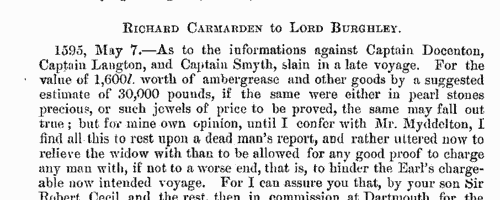
| Liegemen and Traitors, Pirates and Spies
(1625-1626)
The Privy Council of Charles I was responsible for internal security in England and Wales, and dealt with all manner of special and urgent matters
| Sample scan, click to enlarge

| PCC Probates and Administrations
(1631)
The Prerogative Court of Canterbury's main jurisdiction was central and southern England and Wales, as well as over sailors &c dying abroad: these brief abstracts, compiled under the title "Year Books of Probates", and printed in 1902, usually give address, date of probate and name of executor or administrator. They are based on the Probate Act Books, cross-checked with the original wills, from which additional details are, occasionally, added. The original spelling of surnames was retained, but christian and place names have been modernised where necessary. | Sample scan, click to enlarge
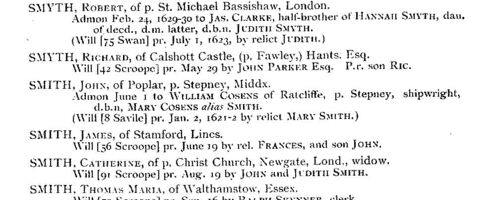
| PCC Probates and Administrations
(1632)
The Prerogative Court of Canterbury's main jurisdiction was central and southern England and Wales, as well as over sailors &c dying abroad: these brief abstracts, compiled under the title "Year Books of Probates", and printed in 1902, usually give address, date of probate and name of executor or administrator. They are based on the Probate Act Books, cross-checked with the original wills, from which additional details are, occasionally, added. The original spelling of surnames was retained, but christian and place names have been modernised where necessary. | Sample scan, click to enlarge
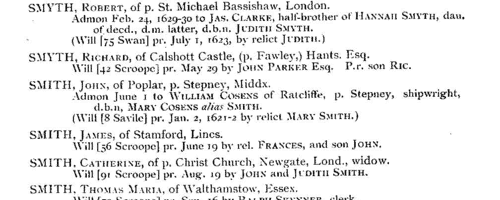
| PCC Probates and Administrations
(1634)
The Prerogative Court of Canterbury's main jurisdiction was central and southern England and Wales, as well as over sailors &c dying abroad: these brief abstracts, compiled under the title "Year Books of Probates", and printed in 1902, usually give address, date of probate and name of executor or administrator. They are based on the Probate Act Books, cross-checked with the original wills, from which additional details are, occasionally, added. The original spelling of surnames was retained, but christian and place names have been modernised where necessary. | Sample scan, click to enlarge
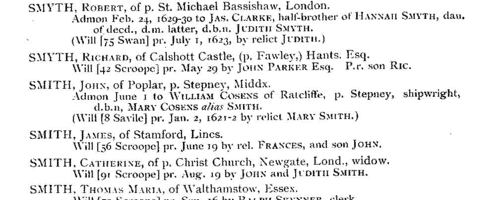
| St Albans Archdeaconry Marriage Licences: Brides
(1636)
Southern Hertfordshire lay in the archdeaconry of St Albans. Marriage licences registered in the archdeaconry act books from 1584 to 1639, and surviving bonds and allegations from 1611 to 1620, 1625 to 1627, 1633 to 1637 and 1661 to 1668 were abstracted by A. E. Gibbs and printed in volume 1 of the Herts Genealogist and Antiquary published in 1895. Both the act books and the bonds normally give full name and parish of bride and groom, and state whether the bride was maiden or widow. A widow's previous married surname is given, not her maiden surname. Occasionally (doubtless when a party was under age) a father's name is given. The later act books sometimes stated at what church the wedding was intended to be celebrated. The marriage bonds give the name of the bondsman or surety. The surety's surname is often the same as the bride or groom, and doubtless in most cases the bondsman was a father or close relative; but a few innkeepers and other tradesmen of St Albans also undertook this duty. | Sample scan, click to enlarge

| Wills proved at York: Names of Testators
(1627-1637)
The diocese of York comprised most of Yorkshire, and Nottinghamshire: the York Exchequer court was the ordinary probate jurisdiction for the Yorkshire part of the diocese, but some wills from Nottinghamshire and other parts of the province of York were also proved there. Dr Francis Collins compiled this index to the transcribed wills of the Prerogative and Exchequer Courts in the York registry proved from 1627 to 1637. The date on the left is that of probate; the testator's full name is then given (surname first), parish or place of abode, and sometimes occupation, and date that the will was executed; and volume and folio number where it the transcript commences. The Act Books were used by Dr Collins to supply deficiencies in the information from the transcripts. | Sample scan, click to enlarge

| Wiltshire freeholders
(1625-1645)
Inquisitions post mortem were held after the death of freeholders who held their estates in capite or in chief, i. e., directly from the crown. The inquisition, held by the royal escheator upon the oath of jurors from the county who were also normally freeholders, recorded what estates the deceased had held, by what tenure, what they were worth, the date of death, who was the next heir, and whether the heir was of age. The sample scan shows an unusually brief inquisition: these abstracts usually run to two or three pages of print. | Sample scan, click to enlarge
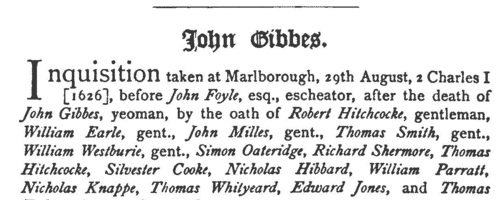
| PCC Probates and Administrations
(1645)
The Prerogative Court of Canterbury's main jurisdiction was central and southern England and Wales, as well as over sailors &c dying abroad: these brief abstracts, compiled under the title "Year Books of Probates", and printed in 1906, usually give address, date of probate and name of executor or administrator. They are based on the Probate Act Books, cross-checked with the original wills, from which additional details are, occasionally, added. The original spelling of surnames was retained, but christian and place names have been modernised where necessary. | Sample scan, click to enlarge
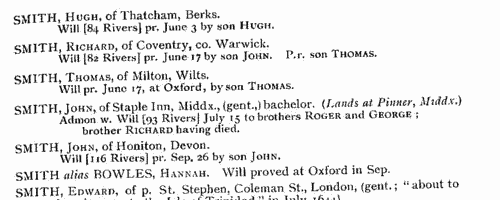
|
Research your ancestry, family history, genealogy and one-name study by direct access to original records and archives indexed by surname.
|











